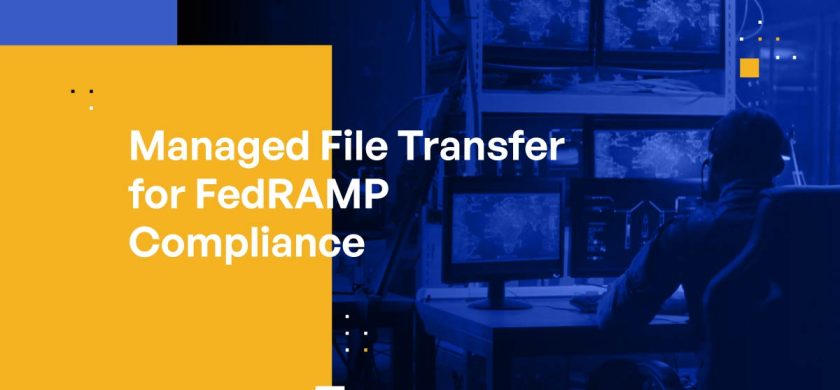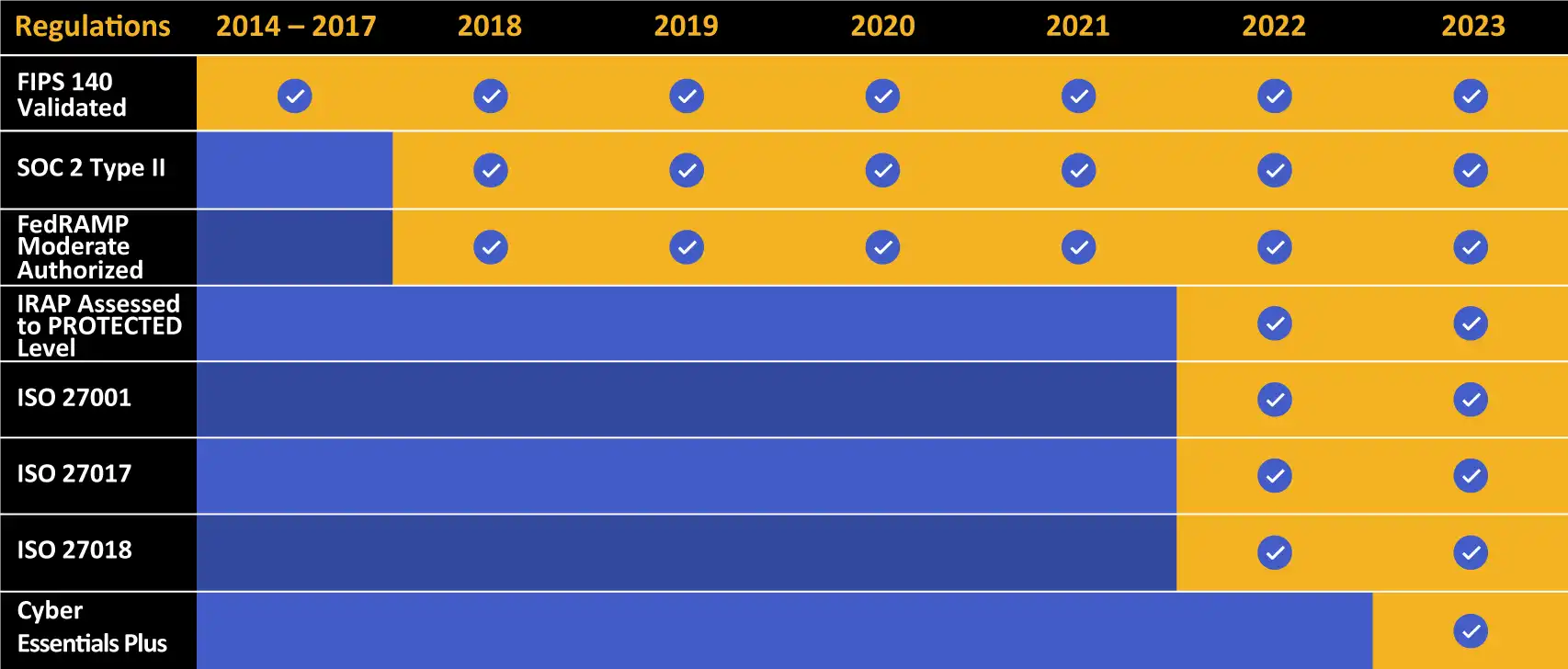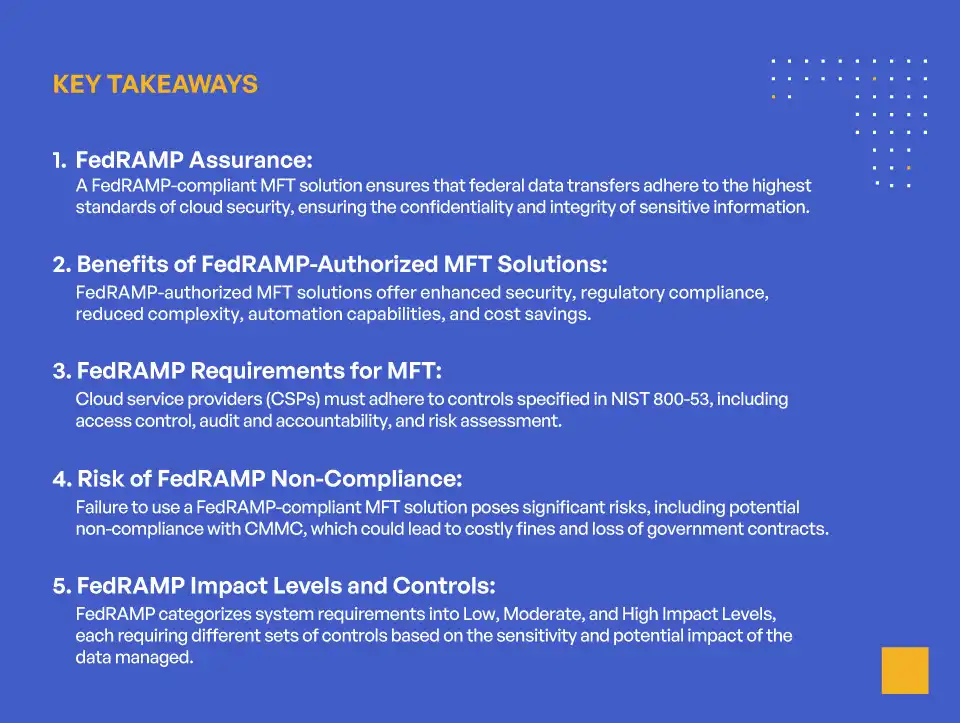
Managed File Transfer for FedRAMP Compliance
If you’re a Department of Defense (DoD) contractor, the managed file transfer (MFT) solution you use to exchange CUI and FCI must meet rigorous FedRAMP requirements. Not doing so risks non-compliance with CMMC, which can lead costly fines and penalties, as well as loss of government contracts. In short, non-compliance should be avoided at all costs.
If, however, your managed file transfer software complies with FedRAMP, you can be assured the federal data you transfer is done with the highest standards for cloud security.
In this blog post we’ll explore the feature requirements defense and other government contractors and subcontractors need in their managed file transfer solution to ensure the software adheres to FedRAMP and is therefore in compliance with CMMC.
The CMMC certification process is arduous but our CMMC 2.0 compliance roadmap can help.
Why FedRAMP Matters
FedRAMP is a compliance framework required by the federal government for all cloud service providers (CSPs) that want to partner with federal agencies. It leverages different technological and security specifications, primarily NIST Special Publication 800-53, to outline security requirements for any CSP handling federal governmental information.
While there are several additional federal compliance frameworks relevant for IT providers in the federal space, FedRAMP is a fundamental compliance framework for cloud providers that want to work with a federal agency.
FedRAMP is critical for all government agencies and contractors, but particularly for the DoD and for defense contractors and sub-contractors because it ensures sensitive information pertaining to DoD initiatives and programs remains confidential and out of the hands of unauthorized personnel, including cybercriminals and rogue nation states.
The FedRAMP certification process is long and rigorous, and it includes necessary testing and audits from qualified Third-Party Assessment Organizations (3PAOs). But once certification is complete, the CSP is considered FedRAMP authorized and its product offerings are cleared for use with federal agencies and partnering contractors and sub-contractors.
Requirements for FedRAMP Authorization
At its heart, FedRAMP calls for CSPs to adopt controls (specified in NIST 800-53) related to different potential areas of intrusion. This includes controls in families like:
- Access control
- Awareness and training
- Audit and accountability
- Risk assessment
- Physical and environmental protection
- Among others
These controls outline what a CSP must implement, given the data they manage. Depending on that information, the CSP may need more advanced controls in place to earn certification.

Is FedRAMP Mandatory?
Yes, FedRAMP is mandatory for all cloud service providers (CSPs) processing, storing, or sharing federal data, including controlled unclassified information (CUI). All federal agency cloud service procurements must obtain FedRAMP authorization prior to use. FedRAMP’s implementation ensures that all federal agencies have an agreed-upon baseline of security requirements before they can use any cloud services. It also enables agencies to rapidly and cost-effectively adopt cloud solutions while maintaining a secure environment and protecting the government’s data. Ultimately, complying with FedRAMP will help agencies protect their networks and data as they migrate to the cloud.
FedRAMP Impact Levels: Which One Do I Need?
The FedRAMP framework categorizes system requirements into different “Impact Levels” that emphasize different types of data that a CSP might store or manage. These levels are defined in FIPS 199, which categorizes data and the responsibilities of agencies using these kinds of data based on criteria like confidentiality, security, and necessary integrity.
Using these criteria, FedRAMP defines its three Impact Levels as Low, Moderate, and High:
- Low Impact references controls necessary to protect information where loss, theft, or damage will have minimal impact on the agency or citizens. Generally, this data is public through some method already, but still requires protection in a cloud environment.
- Moderate Impact refers to controls that protect data where loss, theft, or damage will have a significant impact on the operation of an agency or its constituents. These controls cover private data that can cause financial or in some cases even physical harm, depending on the information.
- High Impact refers to controls that protect private data where damage or theft will cause catastrophic impact to an agency or constituents. Loss of this data can significantly or completely negate the ability of an agency to even continue operation. Additionally, loss of this data could cause severe financial loss or physical harm, including loss of life.
As the stakes of protection and compliance increase across these three FedRAMP Impact categories, the number of necessary controls for each category also increases.
The Impact Level, and the volume of controls you need to implement or have in place, depends on the kind of data you manage for a federal agency.
FedRAMP’s Implications for Managed File Transfer
Any cloud-based system used to share, transfer, receive, or store CUI and FCI must be FedRAMP Authorized. This applies to email, file sharing, secure file transfer protocol (SFTP), and, yes, managed file transfer.
At a minimum, any FedRAMP-compliant CSP will need to have some sort of encryption and security to manage the safety of data in transit. Most managed file transfer solutions use a secure file transfer, like SFTP, that can fit into a compliance strategy.
KEY TAKEAWAYS

KEY TAKEAWAYS
- FedRAMP Assurance:
A FedRAMP-compliant MFT solution ensures that federal data transfers adhere to the highest standards of cloud security, ensuring the confidentiality and integrity of sensitive information. - Benefits of FedRAMP-Authorized MFT Solutions:
FedRAMP-authorized MFT solutions offer enhanced security, regulatory compliance, reduced complexity, automation capabilities, and cost savings. - FedRAMP Requirements for MFT:
Cloud service providers (CSPs) must adhere to controls specified in NIST 800-53, including access control, audit and accountability, and risk assessment. - Risk of FedRAMP Non-Compliance:
Failure to use a FedRAMP-compliant MFT solution poses significant risks, including potential non-compliance with CMMC, which could lead to costly fines and loss of government contracts. - FedRAMP Impact Levels and Controls:
FedRAMP categorizes system requirements into Low, Moderate, and High Impact Levels, each requiring different sets of controls based on the sensitivity and potential impact of the data managed.
Managed file transfer (MFT) plays a critical role in federal agencies’ collaboration efforts with partnering contractors. Managed file transfer allows for secure, reliable, and efficient transfer of files, including sensitive or confidential data, between these entities.
Managed file transfer provides crucial features that let organizations automate the exchange of single files, bulk files, or large files between people, computers, or locations, all while ensuring data integrity, security, and compliance with regulatory standards.
A secure managed file transfer solution includes several features, such as:
- Analytics to help provide insights on data usage, transfer times, etc.
- Comprehensive audit logs and audits to help with security and compliance
- Authorization and encryption for content security and privacy
- Dashboards for data visibility and accessibility across an entire organization
It should be evident by now that managed file transfer can play an integral part in agency / partner collaboration. As a result, a CSP’s managed file transfer application must meet FedRAMP requirements. Given the work required for CSPs to become FedRAMP authorized, a FedRAMP authorized managed file transfer solution should stand apart from non-FedRAMP authorized solutions may not offer.
A FedRAMP Authorized managed file transfer solution should have advanced features like:
- Enhanced security: FedRAMP authorized managed file transfer solutions help ensure that data is stored securely and is not accessed by unauthorized users. The solutions also help ensure that all security protocols are constantly kept up to date with the latest changes in technology.
- Compliance: FedRAMP authorized managed file transfer solutions help organizations comply with government security standards. This helps organizations save time and money when it comes to meeting the requirements of particular regulations or policies.
- Reduced complexity: By using a FedRAMP authorized managed file transfer solution, organizations can avoid the complexities of setting up and managing their own managed file transfer solution. This includes dealing with hardware and software updates, ensuring security protocols are up to date, and keeping an eye on user access and activity.
- Automation: Automation is key when it comes to managing file transfers. FedRAMP authorized managed file transfer solutions provide automated tools to create, monitor, and analyze data transfers. This makes it easier to track transfer activity, automate data flows, and identify potential issues.
- Cost savings: Finally, using a FedRAMP authorized managed file transfer solution can provide cost savings by eliminating the need to deploy, maintain, upgrade, and monitor your own managed file transfer system. The cost of licensing and maintaining an managed file transfer solution can be greatly reduced when you use a FedRAMP authorized provider.
Kiteworks FedRAMP Authorized Managed File Transfer Empowers Agency-Contractor Collaboration
The Kiteworks Private Content Network is FedRAMP authorized for Moderate Impact Level information, enabling federal agencies and their partners to send, share, and store sensitive CUI and FCI securely.
Kiteworks secure managed file transfer features several critical security and compliance capabilities required for FedRAMP Authorization, including:
- Logging and documentation: Kiteworks includes logging and reporting tools that can be made FedRAMP compliant. Some of the necessary security controls, particularly those at the Moderate and High Impact Levels, have a FedRAMP audit log or documentation requirement to track data use, access, and breaches.
- Data visibility and accessibility: The Kiteworks dashboard is accessible via the cloud and contains enterprise-grade tools to help manage, audit, and control data across an organization. More importantly, a visual CISO Dashboard coupled with extensive audit logs provide several effective layers of data and event visibility, including uploads, downloads, and attempted user access breaches.
- Security and compliance: Data on Kiteworks servers is encrypted to required levels of compliance for FedRAMP use, including data at rest on a server and in transit over an SFTP for FedRAMP connection. Likewise, other forms of communication like email for FedRAMP can also be utilized using encrypted connections.
- Physical and administrative safeguards: Kiteworks maintains the required physical and administrative safeguards for FedRAMP certification. This means appropriate protections against unauthorized physical access to a server room or workstation.
- Private cloud deployment: Shared public clouds can pose problems for agencies and providers that want to ensure their data is isolated from potential attack surfaces. With Kiteworks, you get private cloud infrastructure, including private content communication, file systems, database services, and visualization and logging tools, to track third-party traffic moving in and out of your system.
To learn more about Kiteworks’ FedRAMP Authorized managed file transfer capabilities, schedule a custom demo today.
Additional Resources
- eBook 5 Reasons Why Security-First Businesses Are Choosing FedRAMP
- Blog Post SFTP for FedRAMP: Compliance and Authorization Solutions
- Blog Post Why FedRAMP Is Your Best Bet, Even for Commercial Businesses
- Article FedRAMP Compliance & Certification | Why It Is Important
- Blog Post What Are Data Compliance Standards?

